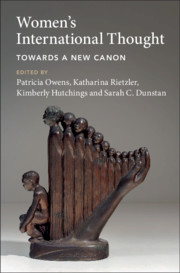Book contents
- Women’s International Thought: Towards a New Canon
- Women’s International Thought: Towards a New Canon
- Copyright page
- Contents
- Preface and Acknowledgments
- Introduction
- 1 Field and Discipline
- 2 Geopolitics and War
- 3 Imperialism
- 4 Anticolonialism
- 5 International Law and International Organization
- 6 Diplomacy and Foreign Policy
- From The Saar (1934)
- From “The War Aims of World War I and World War II and Their Relation to the Darker Peoples of the World” (1943)
- From The Rome–Berlin Axis (1949)
- From Foreign Policy without Fear (1953)
- From “India’s Foreign Policy Today” (1958)
- From “Decisionism” (1964)
- From The Debatable Alliance: An Essay in Anglo-American Relations (1964)
- From Germany 1789–1919: A Political History (1967)
- Margaret Lambert
- Merze Tate
- Elizabeth Wiskemann
- Vera Micheles Dean
- Adda B. Bozeman
- Judith Shklar
- Coral Bell
- Agatha Ramm
- 7 World Peace
- 8 World Economy
- 9 Men, Women, and Gender
- 10 Public Opinion and Education
- 11 Population, Nation, Immigration
- 12 Technology, Progress, and Environment
- 13 Religion and Ethics
- Index
Judith Shklar
from 6 - Diplomacy and Foreign Policy
Published online by Cambridge University Press: 12 April 2022
- Women’s International Thought: Towards a New Canon
- Women’s International Thought: Towards a New Canon
- Copyright page
- Contents
- Preface and Acknowledgments
- Introduction
- 1 Field and Discipline
- 2 Geopolitics and War
- 3 Imperialism
- 4 Anticolonialism
- 5 International Law and International Organization
- 6 Diplomacy and Foreign Policy
- From The Saar (1934)
- From “The War Aims of World War I and World War II and Their Relation to the Darker Peoples of the World” (1943)
- From The Rome–Berlin Axis (1949)
- From Foreign Policy without Fear (1953)
- From “India’s Foreign Policy Today” (1958)
- From “Decisionism” (1964)
- From The Debatable Alliance: An Essay in Anglo-American Relations (1964)
- From Germany 1789–1919: A Political History (1967)
- Margaret Lambert
- Merze Tate
- Elizabeth Wiskemann
- Vera Micheles Dean
- Adda B. Bozeman
- Judith Shklar
- Coral Bell
- Agatha Ramm
- 7 World Peace
- 8 World Economy
- 9 Men, Women, and Gender
- 10 Public Opinion and Education
- 11 Population, Nation, Immigration
- 12 Technology, Progress, and Environment
- 13 Religion and Ethics
- Index
Summary
The most prevalent form of decisionism today is not concerned with domestic politics. It is rather centered on the all-important realm of foreign policy. The realism of the moment is no longer legal, but political. This realism has as its main theme the notion that power is, or at any rate ought to be, the central concept of politics, especially of international politics. Without this notion, it is argued, intellectual disorder and practical failure are bound to occur. Considering the vagueness of such favorite realist conceptions as “power” and the “national interest,” the great professional and popular appeal of this neo-Machiavellian doctrine might seem astonishing. It is only when its negative impulses are understood that realism, as an ideological reaction, becomes comprehensible. For power as the central concept of political thought makes sense, even as an ordering device, only if it is understood as a negation. Power politics is the antithesis of legalistic and moralistic politics.
- Type
- Chapter
- Information
- Women's International Thought: Towards a New Canon , pp. 345 - 350Publisher: Cambridge University PressPrint publication year: 2022



